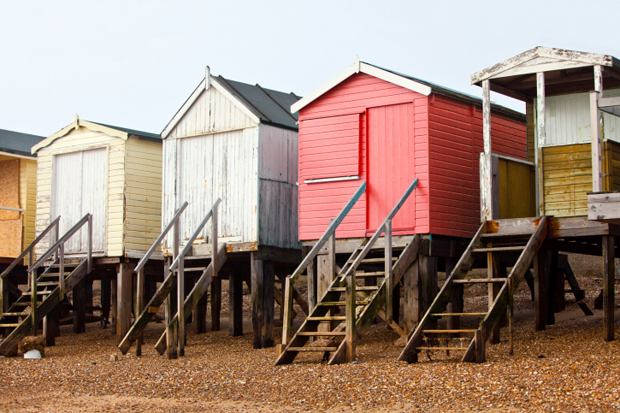This is to be one of those columns that makes the writer faintly wish there wasn’t an internet. It would be one thing merely in print — ephemeral, swiftly forgotten, to be stumbled across only by like-minded individuals en route from Charles Moore to Taki — but online I fear there may be sniggering. ‘What planet is he on?’ they will be asking on Twitter, but then, I suppose, they always are.
The fact is, there’s been a question preying on my mind these last few weeks and I’m going to be bold, and ask it. You may snigger, you may mock and you may sneer, but that won’t make my question any less valid. So here goes. I’ll be nearly 40 in a couple of years. And I keep being told that I live a life of relative privilege. So. Why the hell don’t any of my friends own holiday homes?
OK, so that’s not strictly true. My colleague Matthew Parris, I have been reading, has recently bought a windowless cavern under a dusty Spanish desert and put a bathroom in it. This should be acknowledged, albeit with a degree of envy I’ll leave entirely up to you. But Matthew, while a friend, is not of my generation. And among my peers? Nothing. Not a gîte, not a chalet, not a dacha, not a but’n’ben or a lodge. No Cornish beachhouses, no Ibiza villas, no converted French barns, no enviable farmhouses of Cotswold stone in which to be mocked for having a kitchen supper. None of that at all.
This isn’t a whine. It sounds like a whine, right? But it isn’t one. A few of my peers and relatives do, in fact, have various retreats at their disposal, via parents, and are sometimes kind enough to put them at mine. Ask where they came from, though, and the answer is always the same. ‘Oh, we bought it in the 1970s,’ they’ll say, ‘when we were about your age.’ But I’m exactly my age now. I exist in a world that is so safely middle-class that it’s not really in the middle at all. And yet all of this is in no way on the cusp of happening.
There are still 165,000 second homes in Britain. I know this because Sir Andrew Motion of the Campaign to Protect Rural England made a big old fuss about them last year, complaining that they were ‘gutting’ rural communities and called for sweeping taxes. Frankly, as a soulless, hypocritical, fairly affluent London professional, I’d expect to be reaping the benefit. But no. Which is weird. Isn’t it?
I have two theories. One is merely financial. The average age at which one buys one’s first home is now 37, perhaps a decade older than it was a generation ago. So it could be that the great project of holiday homes, once embarked upon enthusiastically by those with young families, has drifted in turn towards those of late middle age.
This is almost certainly partly true. Maybe, though, it’s not the whole truth. The holiday home used to be a fairly widespread aspiration, not only for the rich. There were timeshares, too, and static caravans on the coast. And now? Maybe it just… isn’t. With low-cost flights and the great democratisation of long-haul travel, and property costs simultaneously soaring, maybe even those who can still afford it simply prefer to spend their money on other things.
I suspect you might find that the London pied-à-terre is in similar decline. A few months ago, the concierge of one top London hotel told me that the past few years have brought a notable weekend influx of British guests who, in earlier times, would have kept their own two-bed Chelsea boltholes. And as for those 165,000 second homes in Britain? My hunch would be that most are owned by pensioners and within 20 years they’ll all be holiday rentals. And we shall look back to the time when hordes of the middle classes kept cottages, farmhouses and villas standing largely empty, and it shall seem as distant and weird to us as the way they used to have domestic staff living in the attic.
Double talk
Last time I was here (I’ve been away, as it happens, in somebody else’s holiday home), I wrote about Israel. This was before the latest war began, but after it looked like it was about to, and I shared the concern that this country, once so familiar to European sensibilities, was starting to feel decidedly foreign. And the good people of The Spectator put it online twice.
The first time, it ran under the headline ‘I’m not comfortable with Israel any more. And I’m really not comfortable with that’. It was a fair reflection of the text. The response was sizeable, and appeared to be mainly from sad Jews, hurt Israelis and furious Zionists. Douglas Murray wrote a very good blogpost about how I was the one suffering moral drift, not them.
The second time, it ran under the headline ‘If Britain was being shelled, as Israel is being now, how would we respond?’ This was a less fair reflection of the text, but only marginally, and the response was again sizeable. This time, though, it was from sad peaceniks, angry pro-Palestinian activists and furious anti-Zionists. A columnist in Saudi Arabia’s Arab News even wrote a (less good) column about what a mindless Israeli shill I was.
The text in both was identical. As a columnist, I know I quite often sit on the fence. It’s a first, though, even for me, to be on both sides of it at once.
Got something to add? Join the discussion and comment below.
Get 10 issues for just $10
Subscribe to The Spectator Australia today for the next 10 magazine issues, plus full online access, for just $10.
Hugo Rifkind is a writer for the Times.
You might disagree with half of it, but you’ll enjoy reading all of it. Try your first month for free, then just $2 a week for the remainder of your first year.















Comments
Don't miss out
Join the conversation with other Spectator Australia readers. Subscribe to leave a comment.
SUBSCRIBEAlready a subscriber? Log in